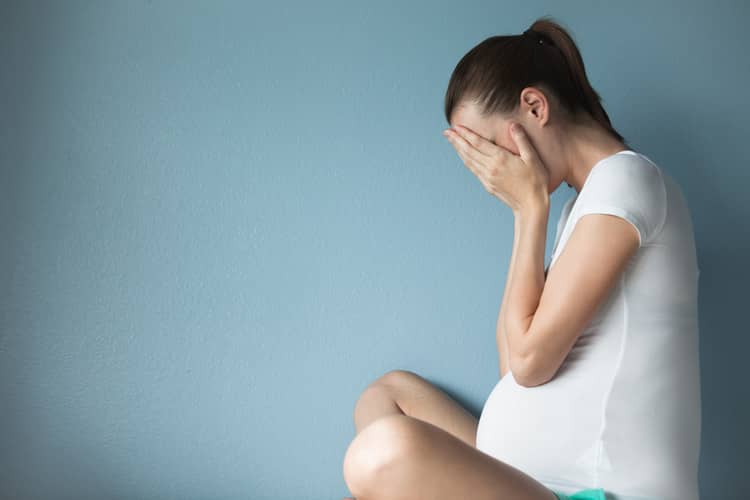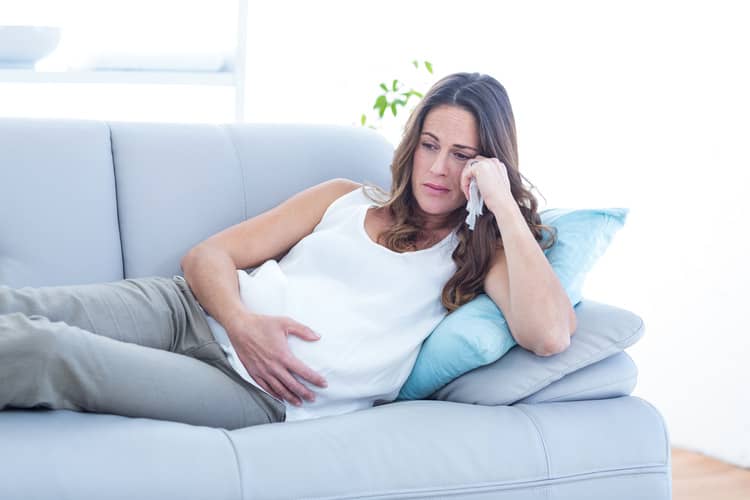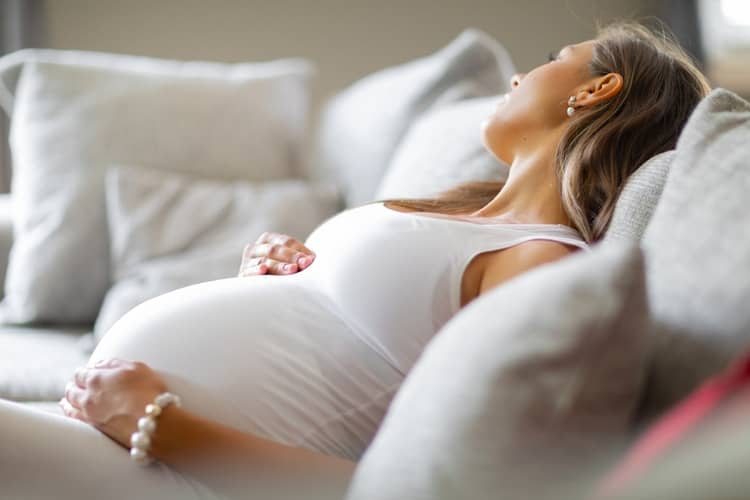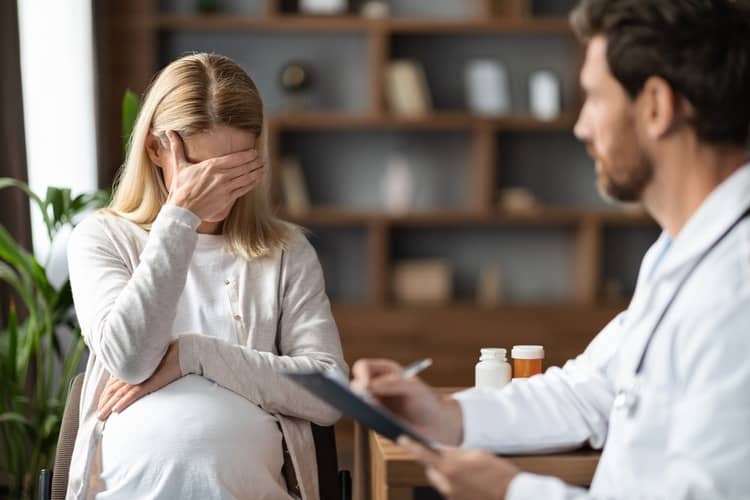
Depression in pregnancy - sadness, fear and negative thoughts in pregnancy
The standard formula says that pregnancy is a magical period in a woman's life, the culmination of which is the arrival of a beloved offspring into the world. The thoughts of every woman who is proud of her pregnant belly and is looking forward to her desired baby also go in this direction. However, hormonal and physiological changes along with intense symptoms mean that not every woman experiences a happy and problem-free pregnancy. Worries, fear of childbirth, mood swings or a poorly adjusted psyche during pregnancy. A woman's cocktail of hormones, feelings and emotions can wreak havoc. Negative thoughts will cause anxiety, stress, and all in all, this can mean that such a condition will develop to the extent that it will turn into pregnancy depression. How to avoid pregnancy depression?
- Depression in pregnancy - stress, fear and anxiety
- Manifestations of prenatal depression
- Causes of pregnancy depression
- The effect of depression on pregnancy and the child
- I can't handle pregnancy - diagnosis and treatment of depression
- How to avoid depression before childbirth?
- Depression in pregnancy - experience
- The most frequent questions - FAQ
- Comments
The non-profit organization Mayo Clinic from the American Rochester, based on its own statistics, states that at least 7% of women experience depression during pregnancy. However, this is only a number that is clinically confirmed and does not include women who do not solve the problem of depression with a professional form of treatment - therapy. The Cleveland Clinic Journal of Medicine published research that shows that 10 to 20% of women in the United States suffer from pregnancy or postpartum depression, or both. While in some cases bad psychology or anxiety states are a temporary phenomenon, in other cases it is a chronic condition. The impact of prenatal depression has a negative impact not only on the woman herself, but can also affect the fetus. What are the causes of pregnancy depression? What are the symptoms of postpartum depression?
Depression in pregnancy - stress, fear and anxiety
In connection with pregnancy, the combination of the words postpartum and depression is more familiar. It is precisely the term postpartum depression that is often inflected, which is also perceived by expectant mothers as a possible risk. However, when it comes to pregnancy depression, it is often perceived as something that only affects women who suffered from depression before pregnancy. In a way, the prevailing opinion seems to be that only a woman who is already a psychiatric patient can have depression during pregnancy. This is a huge mistake, because in many cases, stress from pregnancy, fear or sadness and external stimuli are a natural prerequisite for the development of depression before childbirth. What exactly is pregnancy depression?
The characteristics of pregnancy depression are almost identical to clinical depression. It is necessary to realize that depression is a serious psychiatric illness. During pregnancy, chemical processes in the brain are affected by hormones that affect the woman's body during pregnancy. The effects of these chemical processes and hormones are directly related to the development of depression and anxiety. In addition to hormonal changes, pregnancy depression is caused by the influence of various external factors that act long-term or in the short term and produce stress, fear, sadness and cause negative thoughts. For example, very often pregnancy depression appears in women who have become pregnant unexpectedly or unintentionally. For them, this life situation means an enormously stressful period full of fear, sadness, uncertainty, which creates an emotional imbalance and begins anxious manifestations that can develop into depression.

Manifestations of prenatal depression
The symptoms of depression during pregnancy can have a different character, depending on the life situation and the state of health of the woman. Depression can arise from various causes, which we discuss in more detail in the paragraph below. If during pregnancy there is talk of mood swings, crying, hypersensitivity, or a woman thinks negatively due to fears about childbirth, or worries about the baby's health, this does not automatically mean depression. A woman with pregnancy depression begins to doubt her maternal abilities, perceives pregnancy as a burden, cannot imagine taking care of a child, and deeper reflection leads to depressive thoughts. However, it is advisable to catch the first warning signs before they begin to play a primary role in the brain of women. Symptoms that persist for more than 14 days can be a clear symptom of the presence or development of depression. Here are some known symptoms of depression in pregnancy.
- Pregnancy sadness and bursts of crying.
- Loss of appetite.
- Lack of concentration.
- Permanent fatigue and insomnia.
- Loss of interest in work, hobbies and ordinary situations that bring joy.
- Lack of communication, closing in front of partner, family and friends.
- Low self-esteem and feelings of guilt.
- A feeling of inferiority, worthlessness and incompetence.
- Gloomy thoughts about pregnancy and child care.
- Feelings of anxiety and hopelessness.
- Doubts about pregnancy and the meaning of life.
- Tendencies to reach for addictive substances - cigarettes, alcohol.
- Thoughts of death and suicide.
If a woman has these symptoms, it is important to notice them. If a woman realizes that negative thoughts often flow through her head during pregnancy, she should talk about them with her partner. If this is not possible, she should turn to family, friends and ideally a doctor. Free psychological telephone consultations for pregnant women are also available. Women with depression or its signs must talk about their feelings.

Causes of pregnancy depression
There can be a huge number of triggers or causes of depression. In many cases, the specific causes behind depression are combined. Hormonal changes are considered the main cause of depression during pregnancy. Every woman's body can deal with such changes differently. As a rule, other life or health problems are added to the hormonal changes themselves, which affect the psyche of a pregnant woman.
Expecting the arrival of a child is undoubtedly a significant moment in a woman's life, or partners. It is a serious decision that has consequences. Fears are always natural and cannot be ignored. It is important to perceive the positive aspects of pregnancy and childbirth. Pregnancy is a joy that also brings certain worries. However, excessive worries turn a joyful pregnancy into a pregnancy full of doubts, worries and sadness.
Hereditary depression
Research in the field of genetics has shown that it is also a genetically determined condition. The assumption is that depression will develop after long-term exposure to stressful factors. Previous family history may not be a determining factor, but it greatly influences the potential development of depression in the expectant mother or may portend a more severe course of depression in the future. It is scientifically proven that if a woman in the family has been diagnosed with a mental or psychiatric diseases, the occurrence of such diseases is more likely. There is no rule that hereditary diseases must be inherited automatically.
Fear of childbirth
It is one of the most common phobias, which even has its own name - tokophobia. Morbid fear of childbirth is an abnormally unnatural fear of impending childbirth. Approximately 10 to 15% of women experience tokophobia during pregnancy. Exaggerated anxiety related to the course of childbirth can cause such serious conditions in a woman that they turn into depression. A woman is so afraid of pain and complications during childbirth that she tries to avoid natural childbirth. Many such psychological (disease) conditions with tokophobia in women end in caesarean section. Often, tokophobia appears in women who also have traumatic experiences from a previous pregnancy.

Concerns about caring for the baby after birth
During pregnancy, a woman naturally thinks about what awaits her after childbirth. What will motherhood be like? Will I be able to take care of the child ? Can I breastfeed him? Will I have milk? Won't my child fall to the ground? The amount of thoughts and information that a woman is trying to process can cause her confusion, which gives rise to fears, feelings of inferiority, and insufficient self-confidence. The woman feels that she cannot take care of the child. She is worried about the future and is stressed about whether she can handle her new role as a mother. Doubts often arise about whether pregnancy is the right thing to do. Multiple pregnancy can also be a strong stressful factor.
Traumatic experiences and bad life situation
One of the most important factors influencing the progressive development of depression is the life situation of a woman. In the case of an unwanted or unplanned pregnancy, negative thoughts are much more common. Not to mention cases where the pregnancy is the result of rape. The psyche of a woman is under an enormous burden. Economic problems and concerns about the woman not being able to provide for the child can also be associated with this. Traumas from previous pregnancies or current relationship problems can also be the impetus for depressive thinking. The trigger can be difficult life situations - death in the family, loss of job, housing insecurity and insufficient support from the partner and the environment.
Symptoms and health complications in pregnancy
The doctor's task is to inform the pregnant woman and prepare her for what symptoms of pregnancy she may experience. He must expect states of nausea, dizziness, heartburn, fatigue, insomnia, headaches or stomach problems. Of course, if a woman also hears about other symptoms and diseases that pregnancy brings, stress arises. Gestational diabetes, hypertension, preeclampsia, low blood pressure, leg swelling, hair loss, contractions or leg pain. The fear of the presence of these diseases can be one of the stimuli that can contribute to depression.
Fear during pregnancy about the health of the newborn
The desire of every woman is to give birth to a healthy child. However, whether you want it or not, they can get information about the possible risks associated with the birth of a child who is affected by various diseases. The mother is worried that the child does not have genetic diseases or mutational defects that would cause him a handicap (underdeveloped organs, deformities, autism, Down's syndrome and other disorders). These concerns can cause depression and negative thoughts during pregnancy. Regular visits to the gynecologist are the basis of prevention.
Expectant mothers are often afraid of harming the baby during childbirth. Strangulation by the umbilical cord, the birth of a dead baby or thoughts of an inevitable caesarean section or birth by bell. Complications during childbirth are a strong stressful factor for the mother, which causes states of anxiety and depression.

The effect of depression on pregnancy and the child
Psychiatric diagnoses are just as risky for the course of pregnancy and the health of the fetus as standard diseases. Depression itself is a condition that needs to be treated and not ignored. The behavior and perception of reality in a woman with depression is often inadequate, the woman is unfocused and imprudent. Excessive stress and fear leads to the fact that a woman can resort to wrong habits - smoking, drinking alcohol or using drugs. He can consume inappropriate foods that can harm the fetus. Depressive conditions can lead a woman to such a stage that she will want to take her own life or cause an abortion, e.g. physical violence - falling or punches in the stomach.
All these negative manifestations can cause difficulties during pregnancy. There is a risk of premature birth, the birth of a child with a low birth weight or even the birth of a dead newborn. Improper eating habits, drinking alcohol or smoking increase the risk of a child being born with a developmental disorder. It is scientifically proven that women who suffered from moderate or severe depression during pregnancy gave birth to children who later developed behavioral or attention disorders. Such children are also more sickly.
I can't handle pregnancy - diagnosis and treatment of depression
Depression was once considered taboo and if a woman could not cope with pregnancy, she was simply considered weak. Today, psychiatric illnesses and depression are considered common illnesses, although they are still not sufficiently communicated to the public. A gynecologist should inform a woman about possible manifestations of depressive thinking during pregnancy. Also thanks to the awareness of this disease, it is possible that a woman will not perceive such negative thoughts as a memento and will not turn into depression. However, the trend of psychiatric diseases is growing, and pregnancy depression is no exception. Statistics are often exaggerated because only a fraction of people seek professional help for advanced depression.
The diagnosis of this disease itself takes place through a combination of several procedures. It is primarily about observation - the very symptoms that can be indicated from the behavior and actions of the woman. The psychotherapist can then, by talking to the pregnant woman, determine whether it is an initial, medium or severe stage of depression. Based on this, appropriate therapy is recommended to the woman. There are many non-pharmacological ways to suppress the symptoms of depression. Most often, women are recommended to undergo effective psychotherapeutic treatments. Antidepressants represent only the last step in the treatment itself and are used if prevention or non-pharmaceutical methods of treatment do not work.

Effective self-medication
What effective self-treatment should look like for women who are prone to depression is very individual. Definitely, the primary goal is for the woman to eliminate negative thoughts related to fear and sadness. It is necessary to set the right regime, allow yourself rest and sufficient sleep. It is ideal to have an exact time when to go to sleep and when to get up. Non-pharmaceutical treatment consists in trying to alleviate the symptoms of depression. Your hobby will help to break the depressive mood. Movement, exercise during pregnancy or longer walks are also great. A great choice is swimming. By exercising during pregnancy, a woman increases her self-confidence and at the same time feels that she is doing something beneficial for herself and her child.
Pregnancy teas with appropriate soothing herbs (chamomile, honeydew) are also suitable. It is best to consult your doctor or pharmacist. Get a suitable pregnancy massage. Don't forget about society and social life, don't be afraid to go to the theater or the cinema with your partner or friends. Read books that take you out of reality. Or find a new hobby - puzzles, secrets, Sudoku.
Communication and professional assistance
If self-treatment does not work and the symptoms of depression do not subside, professional help is necessary. Conversations with a partner, mother, mother-in-law, friends are suitable "amateur" therapy and in many cases help women. Sometimes, however, it has to be a psychologist or a psychiatrist who will deal with your condition professionally and become your next pillar of support. Psychotherapeutic treatments are highly recommended by experts, because thanks to them it is possible to prevent the development of depression and eliminate the symptoms that have already arisen. Know that a regular visit to a psychologist or psychiatrist during pregnancy is no shame, and also think about your child under your heart, who experiences stressful situations intensively with you.
Medicines for depression in pregnancy - antidepressants
The fact is that many gynecologists, obstetricians and researchers agree that pharmacological treatment of depression during pregnancy is not an optimal solution. Antidepressants can have an impact on the development of the fetus and can endanger its health even after birth. Active substances can reach the child through the placenta, which nourishes the child and have a toxic effect on it. However, several psychotherapists argue that there are effective psychopharmaceuticals that do not harm the fetus in any way. Nevertheless, psychiatric diagnoses during pregnancy are treated more conservatively, for example with regularly applied therapy.

How to avoid depression before childbirth?
According to doctors, pregnancy education is the basis of prevention of depression during pregnancy. Practice clearly shows that many women have no idea how their own biological processes work in the body (eg menstruation). In addition, it is also important for a woman to be prepared for pregnancy. If a woman has psychological problems, the pregnancy should be planned.
Pregnancy education is an activity that will help a woman to better understand all the processes that take place in a woman's body during pregnancy. It is not necessary to read about all the risks and unique complications that occur in some cases, but a woman should have an approximate idea of the burden that pregnancy and subsequent parenting bring. It is also recommended to take courses in postpartum care of a child or a course in preparation for childbirth.
A woman should avoid stressful situations, save herself, avoid haste. Communication with your surroundings is important. Exchanging experiences with other parents or future mothers. There are many communities where mothers support each other, solve joys and worries and thus relieve excessive stress. This is a great form of preparation for childbirth and parenthood.
Depression in pregnancy - experience
Depressive states and negative thoughts during pregnancy are also solved by women on discussion forums, where they turn to other mothers who will provide them with appropriate advice. Women often communicate the problem of how to deal with an unexpected pregnancy. Very often, women also fear that they will not be able to give birth and fear for their baby, who may suffer from their fears. Some mothers were lucky enough to have sufficient support in their partner relationship. One of the mothers regularly discussed her feelings with her doctor, who provided her with support. However, there are also cases when a psychiatrist had to intervene in the treatment, because the mother had melancholic moods and a feeling of uselessness.
Other women do not recommend women to read discussion forums, the content of which many times solves problems that stress women significantly. Within the community, women connect and identify with symptoms such as tearfulness, irritability, hypersensitivity or mood swings. Discussants also point to the fact that concerns about pregnancy, childbirth and parenting are normal and a sign that a woman wants to be a good mother.
The most frequent questions - FAQ
Depression during pregnancy is a serious condition that needs to be talked about. Negative thoughts during pregnancy, bouts of sadness, crying, feelings of hopelessness, anxiety or doubts about pregnancy are a clear sign that the psyche of a pregnant woman is not well. Pregnancy depression itself, like clinical depression, is a psychiatric illness that requires therapy depending on the stage of the illness. Do you have personal experience with the symptoms of depression during pregnancy? Are you pregnant and feel like you can't handle pregnancy? Don't hide it. We will be happy if you share your feelings or experiences with depression during pregnancy in the discussion below the article.
Why does a woman have negative thoughts during pregnancy?
Do medications help with depression during pregnancy?
Why do women develop pregnancy depression?
Pridať komentár







